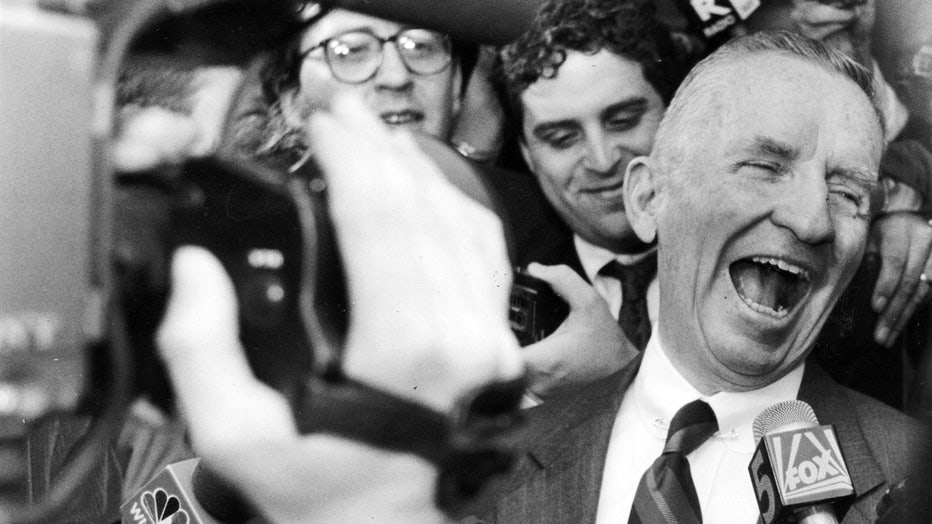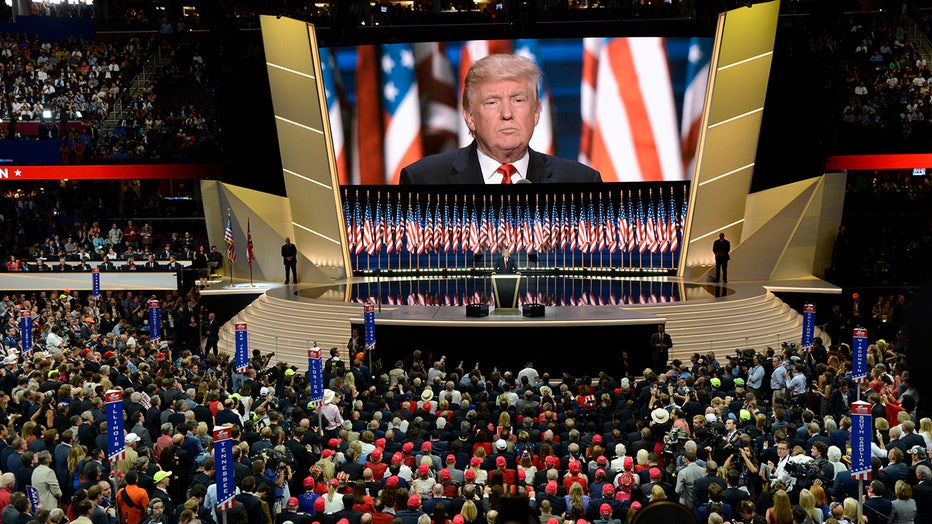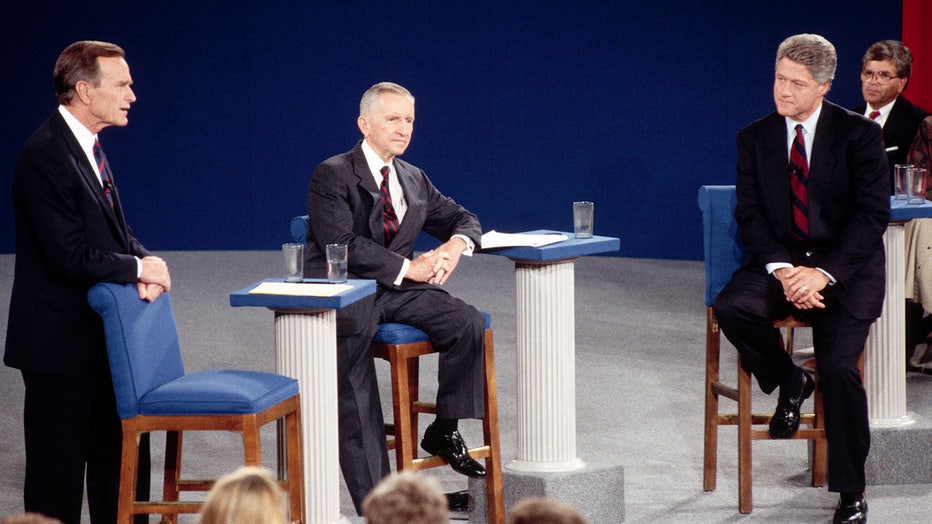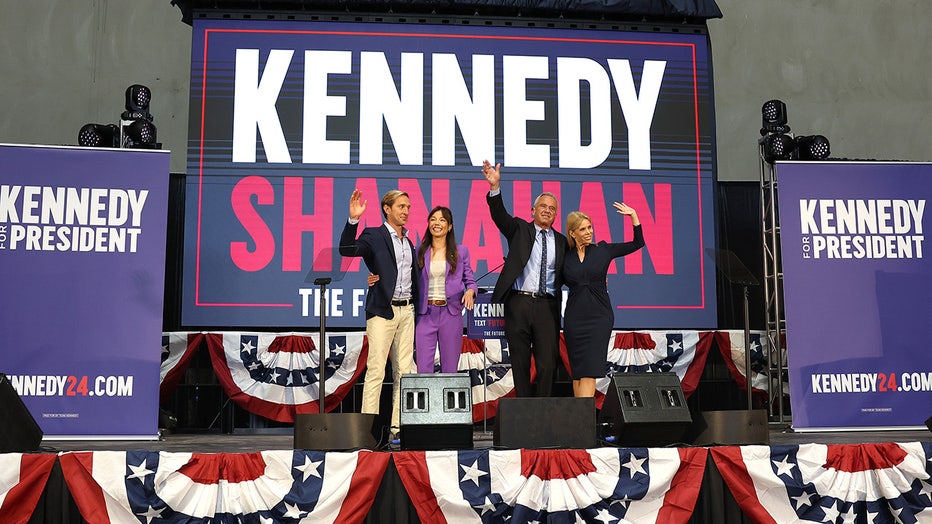How Donald Trump succeeded where Ross Perot failed – and what it means for RFK Jr.
Full episode: Ross Perot grabs the campaign spotlight
Ross Perot’s charts and quips won him plenty of fans, but it didn’t win him the White House. In this full LiveNOW & Then episode, we look back at archived coverage of Perot's unusual presidential runs.
WASHINGTON - Henry Ross Perot, in addition to being a successful businessman, was one of the most successful third-party candidates in modern American history.
"He was different. He was extraordinarily successful in business and that was a point in history, like today, where a lot of people were fed up with politics as usual," Craig Patrick, a political editor at FOX 13 Tampa Bay told FOX TV Stations. "There were economic changes at that time, just as there are today, and with that, you had a plainspoken billionaire who decided to insert himself into the race."
Perot’s appeal as a "different" kind of candidate triggered a movement that had not been seen since Theodore Roosevelt’s run as a third-party candidate, which managed to get 27% of the popular vote.

File: Potential presidential candidate H. Ross Perot laughs with reporters after addressing the American Newspaper Association at the Waldorf-Astoria Hotel in Manhattan on May 5, 1992. (Photo by Jon Naso/Newsday RM via Getty Images)
Perot got 19% of the popular vote during his presidential bid in 1992, which is the best showing by an independent candidate in the past century, encouraging a second run four years later.
"He tried to get it in 1996 and was not successful but still, closing in at 9% of the vote is far more than we usually see," Patrick said.
Perot before politics
The U.S Navy veteran and graduate of the Naval Academy found success in the mid-1960s when his company, Electronic Data Systems (EDS), won contracts with the federal government to help run the then newly-created Medicare and Medicaid health programs.
EDS first sold stock to the public in 1968, and overnight, Perot was worth $350 million, which is about $3.1 billion today. His fortune doubled and tripled as the stock price rose steadily.

File: Speaking through an interpreter, millionaire H. Ross Perot talks with North Vietnamese prisoners of war at a South Vietnamese POW camp April 2, 1970. Perot was on a tour of several such camps to check on the treatment of enemy POW's and to gath
In 1984, he sold control of the company to General Motors Corp. for $2.5 billion and received $700 million in a buyout. In 2008, EDS was sold to Hewlett-Packard Co.
Perot went on to establish another computer services company, Perot Systems Corp. He retired as CEO in 2000 and was succeeded by his son, Ross Perot Jr. In 2009, Dell Inc. bought Perot Systems.
Upon his death in 2019, Forbes magazine estimated Perot’s wealth at $4.1 billion.
Trump’s parallels to Perot
Although the pair ran a quarter-century apart, Donald Trump's campaigns have often drawn comparisons to Perot's.
During his time, Perot was considered a brash showman who promised constituents – many of whom shared the same disdain for politics as usual – that he would essentially make America better under his tutelage.
Sound familiar?
"I think it's quite possible that [Trump] may have seen the relative success of Perot and borrowed certain elements. And there certainly are some parallels. For example, Trump, what's his appeal? At least certainly in 2015, and even today, a lot of people say that he speaks like they do. He doesn't sound or talk like a typical politician. I think the same was definitely said of Perot as well. I think the fact that there were issues that came up that were different from what we had been hearing at that point, certainly would be another parallel," Patrick told FOX TV Stations.

File: On the final night of the convention, Donald Trump accepts the Republican party's nomination for president of the United States, July 21, 2016. (Photo by Ida Mae Astute/Disney General Entertainment Content via Getty Images)
Despite these similarities, Perot and Trump do have one major difference and it’s that Perot ran as a third-party candidate.
"Trump went a different direction, sought a major party nomination. And with that, in 2015 and then again in 2016, Trump found success ultimately in winning the race to the White House, whereas Perot topped out again at around 19.2%," Patrick added.
The Reform Party
Perot’s second campaign in 1996 was far less successful. He was even shut out of presidential debates when organizers said he lacked sufficient support.
"In 1996, one of the biggest challenges that independent or third party candidates have is that the effort is generally built around one person, one figurehead, because it's top down, it's not bottom up. You don't have a lot of local candidates; in fact, you have no local candidates under a particular party banner. And that's ultimately, when a lot of people come out to vote for their local candidates and then will vote for president and other offices along the way. That's one of the many reasons why independent and third-party campaigns fail," Patrick explained.

File: Candidates at the October 15, 1992 presidential debate (Photo by Wally McNamee/CORBIS/Corbis via Getty Images)
Perot recognized that things had changed this second time around and started a third party effort known as the Reform Party, which was relatively successful, but not nearly as powerful as the two main political parties.
"And so it did have a significant amount of traction. There was some question in terms of whether Perot would ultimately run, but in fact, he did. And this go-around, the issues had changed. Yes, he continued to focus on debt and deficit spending, but the focus of his campaign at that point had pivoted to the issue of free trade and NAFTA, which Perot strongly opposed. And that drew some and helped him gain votes. But at that point, given his failure from four years before, he could not replicate what he had achieved back in 1992," Patrick said.
Robert Kennedy Jr.’s parallels to Perot

File: Independent presidential candidate Robert F. Kennedy Jr. and his wife Cheryl Hines greet supporters during a campaign event to announce his pick for running mate at the Henry J. Kaiser Event Center on March 26, 2024 in Oakland, California. Kenn
This year, Robert F. Kennedy Jr. is running as a third-party candidate, like Perot. But, unlike Perot, polls show RFK Jr. isn’t gaining as much traction with American voters.
"Perot had appeal on a specific issue. It was first, as we said, pocketbook issues and balancing the federal budget. It was the deficit, it was debt that was out of control. That was ‘92," Patrick explained.
During his 1996 campaign, Perot highlighted issues such as his opposition to NAFTA and famously said, "There will be a giant sucking sound going south."
"That sound was the jobs sucking out of the United States into Mexico and placed elsewhere," Patrick said. "That ultimately would be the issue. And people who were fed up, maybe lost their jobs, are seeing economic changes that are not to their benefit, were attracted to that. And that ultimately drove Perot's support. He wasn't a well known name until he ultimately caught on with people and had the wherewithal to spend money."
RFK Jr., on the other hand, does not have the wealth but does have a well-known name. Still, many Americans don’t know much about him, Patrick said.
"And what's his defining issue? Perot had a defining issue that drew people. There are issues that RFK Jr. has advanced, but you don't see them driving droves of supporters to him, as we saw with Perot," Patrick offered.
"They are dissimilar candidates," Patrick added. "The only thing they have in common is the fact that they are getting, in the polls, higher levels of support than we typically see in third-party candidates. But their priorities seem to be different, their backgrounds different, their issues different."
This story was reported from Los Angeles; the Associated Press contributed.

